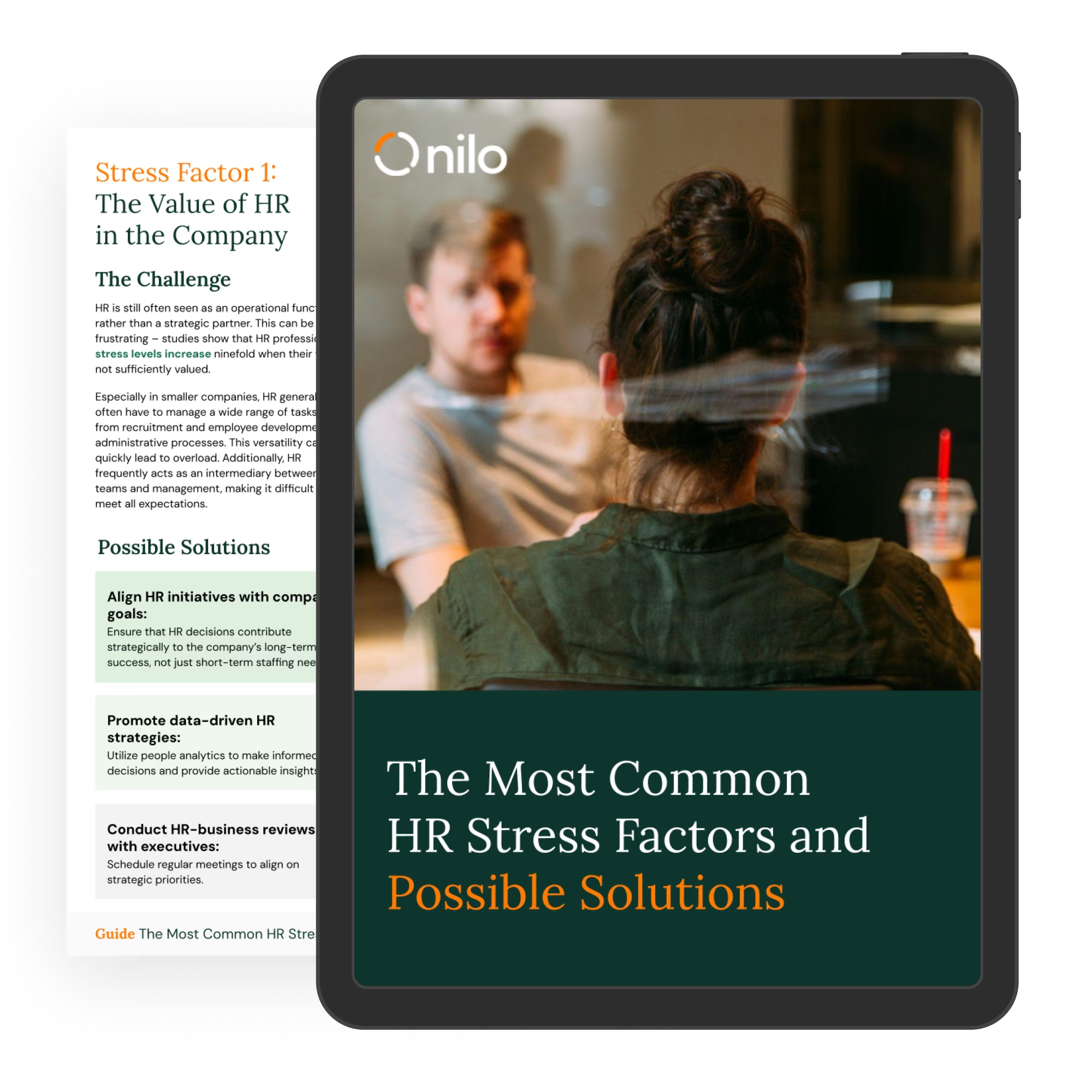HR teams carry a lot of responsibility – often behind the scenes. They ensure candidates feel welcome, employees can grow, and leaders aren’t left alone in tough situations.
And the pressure is intense. HR managers and leads constantly balance competing interests, juggle strategic thinking with operational execution, manage emotions, and keep processes running. No wonder many feel burnt out.
In this article, we’ll show you how to build your personal resilience as an HR professional – with everyday strategies that offer long-term support.
Caught in the Middle: Why Stress Management Is Especially Crucial in HR
HR occupies a unique role in most organizations. As the link between leadership and employees, HR professionals reconcile interests, communicate across all levels, and take on mediating and moderating roles. They’re expected to balance strategic projects with daily operations – often with limited resources or recognition.
Mental health in the workplace makes this particularly clear: HR is expected to build structures that support employee well-being while also serving as the first point of contact for emotional challenges. What often gets overlooked is that HR teams are not therapists or crisis teams – they’re people, too, and they hit their own limits.
The good news? You can take control of part of this. By strengthening your resilience, you’ll find it easier to set boundaries, manage stress, and develop a mindset that helps you grow through challenges.
What Is Resilience?
Resilience is the ability to deal with stress without suffering long-term harm – and sometimes even learn from it. It doesn’t mean denying weaknesses or being “invincible.” Quite the opposite: resilient people are highly aware of their emotions, limits, and vulnerabilities. But they find ways to move through crises and come out stronger.
Organizations can also build and strengthen resilience. There are two types:
- Resilience on a personal level refers to personal inner strength, self-management, and how you handle pressure.
- Resilience on an organizational level is a company’s ability to function (and even thrive) in a dynamic environment and respond quickly to disruptions. It’s reflected in company culture and how teams face challenges.
An online study of 235 employees found that resilience is linked to greater job satisfaction and less emotional exhaustion. It’s worth investing in yourself—and in a healthy workplace culture.
Resilience on a Personal Level: 6 Stress Management Tips for HR
These strategies can help you handle pressure, protect your mental health, and stay effective in your HR role.
1. Set Boundaries and Clarify Your Role
In many companies, the HR role is loosely defined. As a result, People & Culture teams end up with a flood of diverse responsibilities. Everything feels urgent. Meanwhile, expectations are evolving rapidly—people analytics, AI tools, and digital workflows demand new skills.
It’s no wonder that overwhelm, uncertainty, and exhaustion are common. That’s why gaining clarity on your role and setting boundaries is essential:
- Define your core responsibilities—and what’s not your job. Even better: write it down. Make your role visible—to yourself, your colleagues, and leadership. This builds transparency and helps manage expectations.
- Practice saying no. A simple “That’s outside my responsibilities” is often enough. Reflect regularly on situations where a no would have been appropriate.
- Set clear working hours. Whether you block your calendar, set a Slack status, or proactively communicate with your team, visible boundaries help you switch off – especially in remote or hybrid settings.
2. Schedule Time for Breaks, Reflection, and Self-Care
In times of stress, we tend to lose touch with ourselves. We skip breaks, forget to rest, and overlook our daily efforts. That’s why it’s crucial to build in moments of self-care and reflection. Here are a few tips:
- Try journaling: note what went well, your progress, or what’s on your mind. nilo’s digital platform offers prompts to help you get started.
- Pause in stressful moments and ask: “How will I view this in a week, three months, or a year?” This perspective shift can ease the pressure. Breathing exercises also help.
- Reward yourself: small rituals – like a walk, music break, or peaceful coffee – can anchor you during hectic days.
3. Don’t Be Afraid to Ask for Help
When you’re always there for others, it’s easy to forget to ask for support yourself. But resilience isn’t about handling everything alone. Accepting help is key.
- Use coaching or counseling – individually or in group settings.
- Explore digital platforms like nilo that offer content, exercises, and tools to boost your mental resilience and manage stress.
4. Develop a Resilient Mindset
You can’t control everything. But you can always control how you respond:
- Believe in yourself: View challenges as opportunities. Ask, “What can I learn from this?” and trust your ability to handle it. This belief in your own capabilities boosts both satisfaction and performance.
- Accept what you can’t change—and focus on what you can influence. Instead of wasting energy on things beyond your control, strengthen your “circle of influence.”
- Think in solutions: Ask “What’s the next doable step?” instead of “Why does this always happen to me?”
5. Take Charge of Your Workday
Stress often stems from feeling powerless. But when you have influence over how you work, your sense of agency grows—and with it, your motivation and resilience.
- Schedule time for strategic work. Block out focused time for planning—not just reacting. This creates clarity and reduces overwhelm.
- Manage expectations. Be clear about what you can (and want to) deliver. Talk openly about your capacity before things spiral.
- Build routines. Start-of-day rituals or weekly check-ins with yourself help clarify priorities and add structure—especially in fast-moving times.
6. Build a Support Network
In high-pressure roles like HR, going it alone doesn’t work. Connecting with others offers perspective, emotional support—and often, practical solutions.
- Seek mentors. Especially when you feel stuck or overwhelmed, mentors can spot blind spots, offer honest feedback, and share lessons from their own path.
- Find allies. Regular sparring sessions with colleagues or leadership can ease your load.
- Join HR communities. Whether online or in person, these spaces let you exchange insights, share experiences, and learn from others.
Resilience on an Organizational Level: Company-Wide Stress Management
Resilience isn’t a solo act – companies also play a role in keeping HR teams healthy and effective over the long term. It starts with a psychologically safe culture, where challenges, feedback, and mistakes can be shared without fear.
Leaders must understand the pressure HR teams face—and not place the entire burden of mental health on their shoulders. Instead of waiting for a crisis, companies should make space for prevention early on: with training, open feedback practices, and digital tools for reflection and resilience.
Final Thoughts: Resilience Can Be Learned
Resilience isn’t a talent—it’s a skill you can build. Especially in the high-pressure world of HR, it’s worth investing in yourself: through clear boundaries, mindful self-care, and a resilient mindset.
But HR also needs supportive structures and cultures. Resilience is a collective responsibility—and an investment in long-term health, impact, and fulfillment.
Want to foster resilience in your team? Let’s talk!








